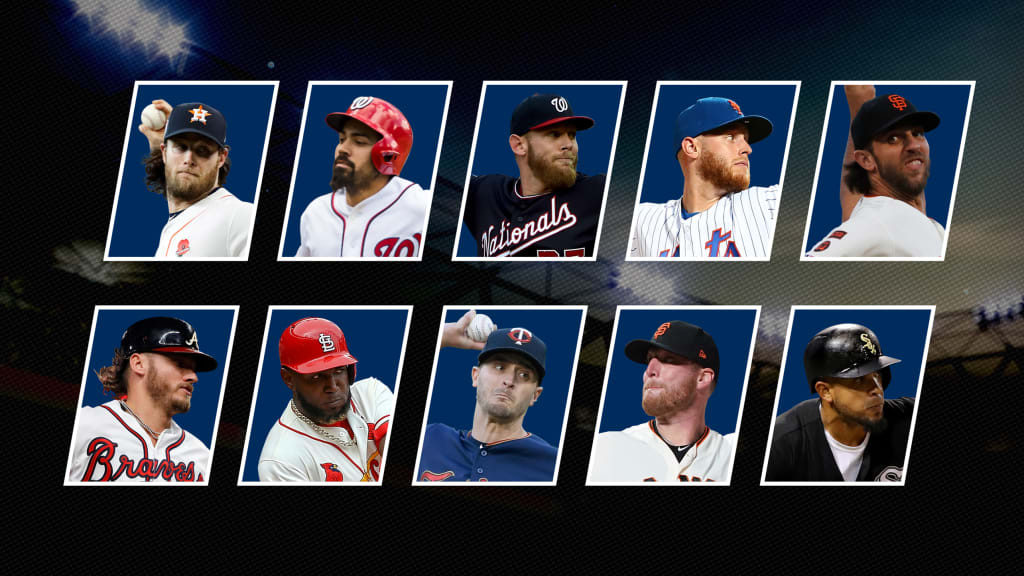
Ten free agents received a qualifying offer last week, and the baseball world learned Thursday whether they accepted or declined the one-year, $17.8 million deal.
The deadline for those 10 players' decisions was 5 p.m. ET. If a player rejects the qualifying offer and signs elsewhere, the club he left will receive Draft pick compensation and the club that signs him will forfeit a Draft pick, and in some cases multiple picks. The value of those picks varies based on whether or not the clubs receive (or pay into) revenue sharing and whether or not the player’s new contract exceeds $50 million (full explanation here).
If a player accepts a qualifying offer, he and the club are locked into a one-year contract worth $17.8 million for the 2020 season. Though it should be noted that players who reject a QO are still free to negotiate a new deal -- for one year or multiple years -- with their original team. Also, players are ineligible to receive a QO if they were traded during the preceding season (Nicholas Castellanos from the Tigers to Cubs in the summer 2019, for example) or if they have received a QO before (Yasmani Grandal, who got one from the Dodgers last year).
Only eight of the 90 players to receive a QO have accepted it, including White Sox first baseman José Abreu and Twins right-hander Jake Odorizzi this year.
Here are the players who received a qualifying offer for 2020, listed by the eight teams they played for in 2019, along with the Draft-pick compensation teams receive if their players declined a qualifying offer to test the open market.
ACCEPTED QUALIFYING OFFER
Twins: Jake Odorizzi (RHP)
Odorizzi accepted the qualifying offer, meaning he will return to the Twins' rotation for 2020. Odorizzi is a consistent arm in the rotation who just had his best season yet, going 15-7 with a 3.51 ERA and 178 strikeouts for the AL Central champs, making his first career All-Star team and turning in a strong start against the Yankees in the postseason.
White Sox: José Abreu (1B)
Abreu accepted Chicago's offer, and he has been a rock at first base for the White Sox ever since he came to the big leagues from Cuba in 2014. He was an All-Star for the third time in '19, hitting .284 with 33 home runs and an AL-leading 123 RBIs. Now he returns to the South Side for another season.
REJECTED QUALIFYING OFFER
Astros: Gerrit Cole (SP)
Cole was dominant in the regular season, leading the American League with a 2.50 ERA and the Majors with 326 strikeouts, and he was dominant in the postseason, with a 1.72 ERA as the Astros fell just short of a World Series title. He becomes the top free-agent pitcher this winter, and his contract could challenge two pitcher records: David Price's $217 million contract for total value, and Zack Greinke's $34.4 million average annual value.
Draft-pick compensation for HOU: After Competitive Balance Round B
Braves: Josh Donaldson (3B)
Coming off an injury-shortened 2018 season, Donaldson took a one-year deal with the Braves last winter and proceeded to return to his old star level, crushing 37 homers for the National League East champs. He'll seek a much bigger contract in this year's market.
Draft-pick compensation for ATL: After Competitive Balance Round B
Cardinals: Marcell Ozuna (OF)
Ozuna is a dangerous hitter, with 29 home runs in 2019, although he's not a great defensive outfielder. His postseason showed the pros and cons of his free-agent case: Ozuna had a 1.335 OPS in the Cardinals' NL Division Series win over Atlanta, but he experienced several defensive gaffes in their NL Championship Series loss to Washington.
Draft-pick compensation for STL: After Competitive Balance Round B
Giants: Madison Bumgarner (LHP), Will Smith (LHP)
Bumgarner looked more like his old workhorse self in 2019, making 34 starts and pitching 207 2/3 innings with a 3.90 ERA and 203 strikeouts. Now he'll search for a lucrative multiyear deal.
Meanwhile, Smith struck quickly, rejecting the Giants' qualifying offer and signing with the Braves on a three-year, $39 million contract. The deal also includes a $13 million club option for 2023. Smith was one of the league's best closers, collecting 34 saves with a 2.76 ERA and 96 strikeouts in an All-Star year.
Draft-pick compensation for SF: After Competitive Balance Round B
Mets: Zack Wheeler (RHP)
Wheeler has electric stuff, and he will be one of the top free-agent starting pitchers available. He's only 29 years old and just set career highs in strikeouts (195) and innings pitched (195 1/3) in 2019, with a 3.96 ERA.
Draft-pick compensation for NYM: After Competitive Balance Round B
Nationals: Anthony Rendon (3B), Stephen Strasburg (RHP)
Rendon is the best position player in free agency, and he just finished leading the Nats to their first World Series title with a superstar postseason. Same goes for Strasburg, who just won the World Series MVP and was absolutely lights-out in October. He might have just pitched his way to a megadeal.
Draft-pick compensation for WSH: After Competitive Balance Round B
---
Lastly, here's a breakdown of how the Draft-pick compensation works for teams who lose players who rejected a qualifying offer, and the penalties for teams who sign those players.
Compensation for losing players who reject their qualifying offer
• The current Collective Bargaining Agreement rules state that if the team that loses the free agent is a revenue-sharing recipient, based on its revenues and market size, then the selection -- if and only if the lost player signs for at least $50 million -- will be awarded a pick between the first round and Competitive Balance Round A of the 2020 MLB Draft. If the player signs for less than $50 million, the compensation pick for those teams would come after Competitive Balance Round B, which follows the second round.
The following 14 teams currently qualify for these picks: the A's, Brewers, D-backs, Indians, Marlins, Orioles, Padres, Pirates, Rays, Reds, Rockies, Royals, Tigers and Twins.
• If the team that loses the player does not receive revenue sharing and did not exceed the luxury-tax salary threshold the previous season, its compensatory pick will come after Competitive Balance Round B. The value of the player's contract doesn't matter in this case.
The 13 teams in this category: the Angels, Astros, Blue Jays, Braves, Cardinals, Dodgers, Giants, Mariners, Mets, Nationals, Phillies, Rangers and White Sox.
• If the team that loses the player went over the luxury-tax threshold, the compensation pick will be placed after the fourth round has been completed (as with the previous scenario, it doesn't matter how much the player signs for).
Three clubs exceeded the threshold in 2019: the Yankees, Red Sox and Cubs.
Penalties for signing players who reject their qualifying offer
Any team that signs a player who has rejected a qualifying offer is subject to the loss of one or more Draft picks. However, a team's highest first-round pick is exempt from forfeiture, which is a big change that went into effect with the new CBA. Three tiers of Draft-pick forfeiture -- based on the financial status of the signing team -- are in place to serve as a penalty for signing a player who rejected a qualifying offer:
• A team that exceeded the luxury tax in the preceding season will lose its second- and fifth-highest selections in the following year's Draft, as well as $1 million from its international bonus pool for the upcoming signing period. If such a team signs multiple qualifying-offer free agents, it will forfeit its third- and sixth-highest remaining picks as well.
Teams in this group this offseason: the Yankees, Red Sox and Cubs.
• A team that receives revenue-sharing money will lose its third-highest selection in the following year's Draft. If it signs two such players, it will also forfeit its fourth-highest remaining pick.
Teams in this group: A's, Brewers, D-backs, Indians, Marlins, Orioles, Padres, Pirates, Rays, Reds, Rockies, Royals, Tigers and Twins.
• A team that neither exceeded the luxury-tax threshold in the preceding season nor receives revenue sharing will lose its second-highest selection in the following year's Draft, as well as $500,000 from its international bonus pool for the upcoming signing period. If it signs two such players, it will also forfeit its third-highest remaining pick and an additional $500,000.
Teams in this group: Angels, Astros, Blue Jays, Braves, Cardinals, Dodgers, Giants, Mariners, Mets, Nationals, Phillies, Rangers and White Sox.
